While the new condos were being built, Spotted Sandpipers continued to breed in a small patch of undisturbed grass. You can hear their cries in the background of the video clip I captured when the Sandhill Cranes' territory or nest was disturbed by the earth moving machinery. The sandpiper also has vanished along with the cranes.
Putting things into perspective, Illinois is the "Prairie State" and boasts many extensive forest and prairie preserves. The loss of this little patch to a long-planned human development seems insignificant in the great scheme of things. Since birds can fly, they are able to seek out new breeding grounds. However, terrestrial creatures such as voles, snakes, rabbits and the muskrats that lived in the single perennial wet area that is now gone are more adversely affected. Any potential new habitat is fragmented and separated by barriers such as roads, buildings and cornfields.
Before the onset of construction, aside from the poles that marked the utilities and the mound of topsoil that was home to the cranes, dump piles of concrete debris were the only elevated locations. They attracted meadowlarks, several sparrow species, pipits and Horned Larks. The piles were conveniently located along the roads, making it easy for me to use the car as a blind and set up my shots in perfect light.
This Spotted Sandpiper suddenly displaced a meadowlark I was photographing on one of the broken slabs.
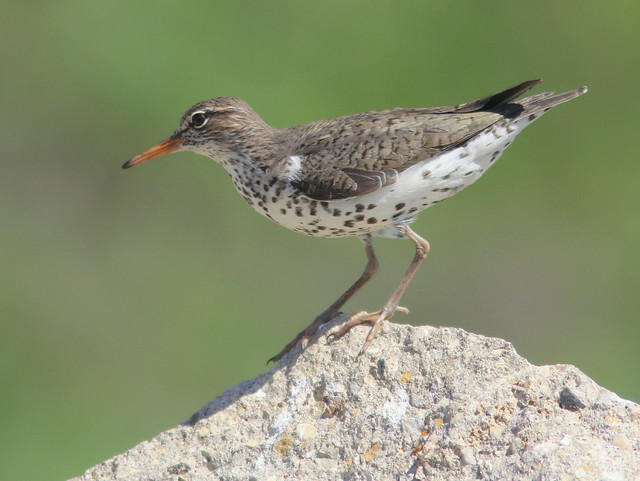
Never before had I been so close to a Spotted Sandpiper. Was it just visiting?
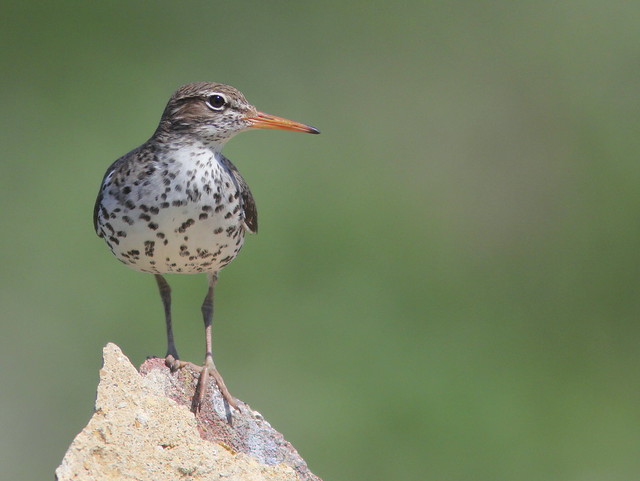
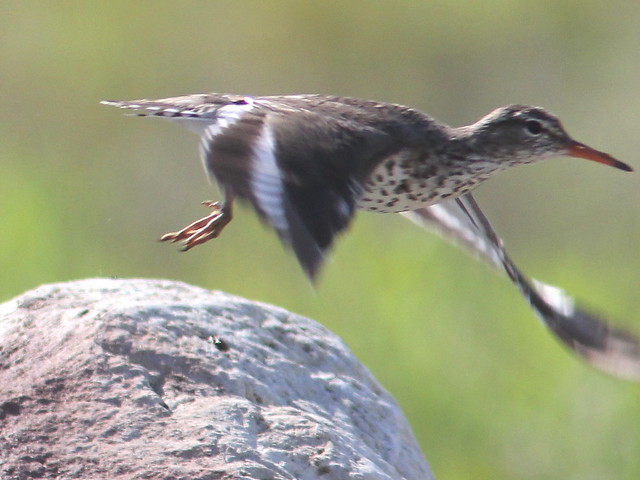
Another surprised me by bursting into song. I realized that I had been ignoring this sound, perhaps interperting it as a variant of a Killdeer's call. Hear its songs and calls at this link.
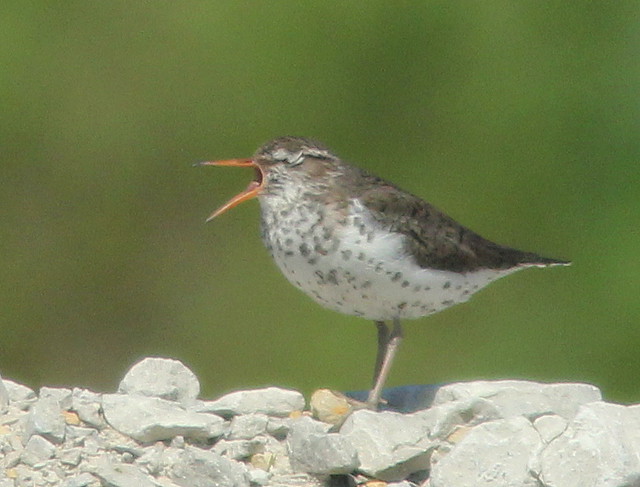
There was very little water nearby, but the sandpipers often foraged in puddles created by rainwater (called "floodles" by local birders). One such depression was deep enough to stay wet throughout most summers.
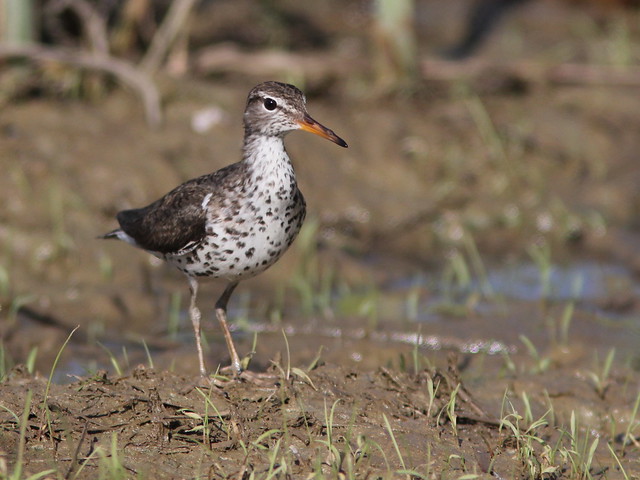
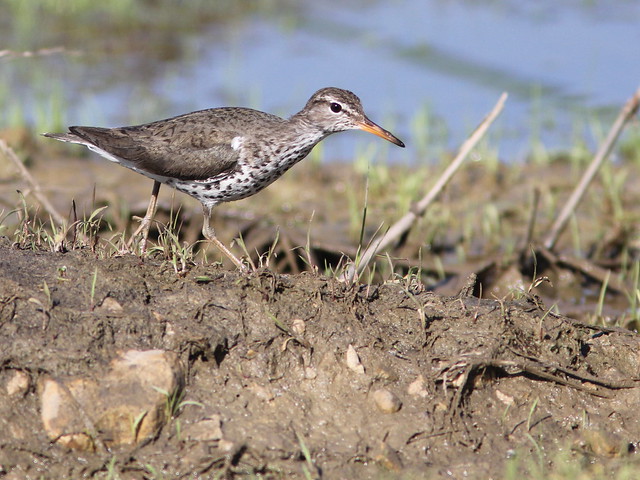
In non-breeding plumage it loses its spots, but the white area in front of the bend in its wing and the white eyebrow help distinguish it from the similar Solitary Sandpiper. (I took this photo in nearby Prairie Green wetlands, Geneva, Illinois).
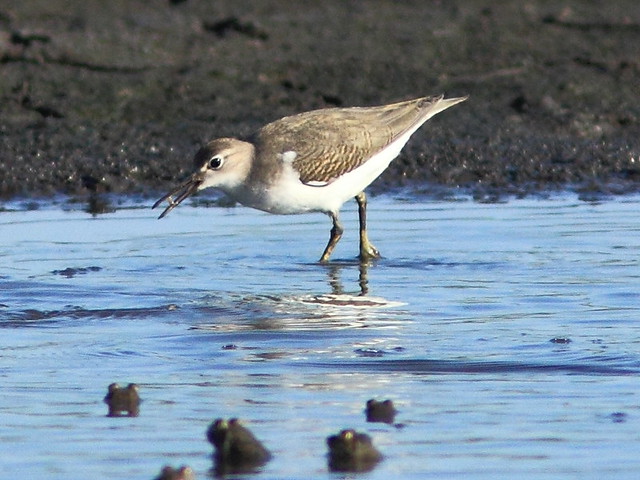
For comparison, here are two Solitary Sandpipers who shared a fluddle with one of the local Spotted Sandpipers. Note their plain face with a bright eye ring and lack of an eye line.

Shared in The Bird D'Pot
Hi Ken This is such a beautiful wader and great shots of it. it was fortunate that you could stay in your car and take the photos.
ReplyDeleteKen, I was nominated 11 birder's today for an award and wanted to add your blog but couldn't due to the number issue, however one of the guys is too busy to do it and I wondered could I put your name forward, in his place? Have a look at my blog and let me know please, adn I can easily change it today. I really love looking at your birds etc on your blog. Margaret
it sure is a beauty, but i'm sorry for the 'progress' that has now driven them out.
ReplyDeleteYour photos are fantastic! This is a bird I love to watch when I go to the shore. You have captured it beautifully!
ReplyDeleteWhat a nice surprise visitor! Great photographs, Ken!
ReplyDeleteso beautiful. Don´t think i Have seen this sandpipre before. Thanks for sharing. :)
ReplyDeleteFabulous photos of this beautiful bird!
ReplyDeleteGreat shots!! Boom & Gary of the Vermilon River, Canada.
ReplyDeleteAwesome serie!
ReplyDeleteFantastic shots of the Sandpiper, love them all. I found one down at Flamingo, but it was in none breeding plumage.
ReplyDeleteAll the best Gordon.
Cute shots of the Spotted Sandpiper!
ReplyDeleteWow! Great photos! Nice flight shot.
ReplyDeleteThat's a pretty bird! Love the one image of it taking off. They're all great tho. Of course.
ReplyDeleteBeautiful! Thank you for sharing :)
ReplyDeleteGreetings from Huldra in Norway :)
Wow Ken, those Spotted Sandpiper pics are just world class. We have to check our autumn Common Sandpipers just in case there's a Spotted there - there never ever is for me.
ReplyDeleteBeautiful birds. It's a shame you will no longer see them in your area.
ReplyDelete